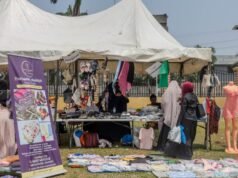There is so much wealth in the Muslim world that if all Muslims, on whom Zakat is due, pay their fair share and it is distributed honestly to the deserved in the society, nobody will face extreme poverty and hunger.
This is according to the Operations Manager, Zakat and Sadaqat Foundation, Mr. Maruf Ahmed, who spoke at a day webinar organized by the Lagos State University Muslim Engineering Graduates Association, LASUMEGA.
In Islamic legal terminology, zakat is used for one of the main obligatory tax imposed upon the wealth of the Muslims derived from the natural resources given to them by Allah.
It is obligatory upon every Muslim, in possession of wealth above a prescribed limit called nisab, to pay Zakat.
Zakat is paid on the surplus of wealth which is left over after a passage of a year. It is, thus, paid on the accumulated wealth at least equal to the limit.
Muslims attitudes to zakat payment
Discussing, ‘Zakat and Waqf as an Instrument of Islamic Wealth and Poverty Alleviation and Redistribution,’ Ahmed said that many Muslims around the world either do not pay Zakat, pay it reluctantly or cut corners to minimize the due amount.
According to him, “this attitude is of course due to weakness in faith as many Muslims have not understood the principles of Zakat and what good it can do for the Muslim community.”
The benefits and implications of neglecting zakat
He listed some of the social benefits of paying the zakat to include strengthening the good relationship between the rich and the poor, promoting open-handedness, generosity and sympathy in a Muslim towards the needy person, enhancing security of live and property, and cleansing the heart of the rich from miserliness”
“The moral and material benefits of zakat are obvious. Giving zakat purifies the heart of the giver from selfishness and greed for wealth and develops in him sympathy for the poor and needy. And receiving zakat purifies the heart of the recipients from envy and hatred of the rich and prosperous, and fosters in him a sense of good will towards his brother Muslims who although they are better off, have shared their wealth with him for the sake of God,” he added.
Quoting Qur’an 9:34-35, he said that there is divine consequences for neglecting the payment of zakat by Muslims.
“On the contrary, a severe punishment awaits those who act miserly and are negligent in paying out Zakat. Allah describes this as “And those who hoard up gold and silver (the money, the Zakat of which has not been paid), and spent it not in the way of Allah, announce unto them a painful torment. On the Day when that (money, gold and silver etc, the Zakat of which has not been paid) will be heated in the fire of Hell and with it will be branded their foreheads, their flanks, and their backs:(and it will be said unto them): ‘This is the treasure which you hoarded for yourselves. Now taste of what you used to hoard’.”
Waqf explained
Ahmed explained Waqf as one of the various forms of voluntary charity which is special because of its distintct feature, which is to preserve the original capital, while the income from such a property is used for charity.
He said Waqf is a unique complement to Zakat in poverty eradication as it ensures capacity building and job creation.
“It prevents property abandonment, loss and wastage. It prompts synergy, joint ownership and rapid growth of business. It allows rapid development of social amenities like Hospital, Mosques, Schools, orphanages and so on,” he added.

The President of LASUMEGA, Mr AbdulGaniy Jawando, said there is a lot of wealth disparity in the society, and one way to ensure the safety of the rich and the comfort of the poor is redistribution of wealth, which is what zakat has come to do.
The webinar was moderated by the Vice President, Africa Middle East Progressive Initiative and a Member of FCT Covid-19 Situation Room, Eng. AbduSabur Oliyide.












